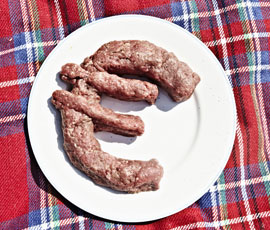Horsemeat scandal blamed on EU mince ban

An EU decision to reclassify types of mince meat processed in the UK caused the horsemeat scandal, a former food safety watchdog executive has claimed.
Mark Woolfe, a food scientist and former head of the Food Standards Agency, said a European Commission decision last year to ban desinewed meat in value ready meals and burgers forced producers to look outside the UK for cheap meat.
As a result, retailers were unable to source meat cheaply enough in the UK to maintain profit margins on value products.
“Processors went overseas to source their ingredients and that was where it all went wrong,” said Dr Woolfe.
In the UK, cheap processed products such as value ready meals and burgers have been using minced meat derived from desinewed meat (DSM) since the 1990s, which was bought in as a replacement for mechanically recovered meat (MRM) – dubbed “pink slime”.
The MRM technique uses high pressure and water to separate edible meat from bone and produces a paste, with the result often losing any resemblance to meat protein.
DSM is considered a much less aggressive technique, but it was interpreted as mechanically recovered meat (MRM) after an EU food and veterinary inspection in April 2012 – and immediately banned from being included as part of the meat constituents on the product label.
Speaking in London on Tuesday (12 February), Dr Woolfe criticised the government and the FSA for not objecting to the commission’s decision.
“Everyone bowed to the European Commission decision on re-classification of DSM at the time and supermarkets seemed unconcerned about the change. There was no issue with its safety and DSM is a good ingredient for value products,” he said.
“Retailers should have recognised the risk and questioned what materials were likely to be used instead of DSM, which is probably included in more than just beef products.”
With cheap horsemeat widely available across the EU, it subsequently made it into products bound for UK supermarket shelves in the form of lasagne, bolognese and value burgers, he added.
Dr Wolfe also warned that traces of horsemeat were likely to turn up in lamb products, such as kebabs.
Science and food law consultant Michael Walker said that a more centralised, regular surveillance was needed in the food chain to ensure that unexpected ingredients did not end up in food.
“We must make sure we are not on the back foot again on this issue, which has the potential to destroy confidence in the agri-food sector,” he said.
Extensive testing is being carried out across the UK to establish the extent of the horsemeat contamination and results are to be released by FERA on Friday.
Horsemeat scandal: Shoppers turn backs on processed food
